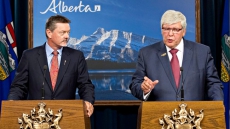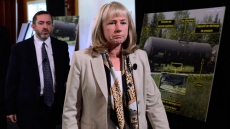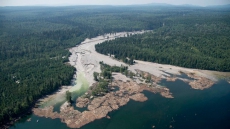CALGARY - For the mayor of North Bay, Ont., it's all about protecting the city's sole source of drinking water from a pipeline spill.
When TransCanada Corp. files a regulatory application later this month for its $12-billion Energy East pipeline, Al McDonald says he'll be looking for assurances that Trout Lake, and the creeks that feed into it, won't be harmed by an oil spill.
"I have to look my community in the eye and say that I've done everything I can to protect our only source of drinking water," said McDonald, who plans to apply for intervenor status at National Energy Board hearings "the minute" the application drops.
"Just about all the issues that are out there in municipal governments ... I would say this one has hit a nerve in our community,"
Energy East would be one of the biggest infrastructure projects in Canadian history, crossing six provinces and traversing 4,600 kilometres. Roughly two thirds of it would make use of underused natural gas pipe that's already in the ground, with new pipe being built through Quebec and New Brunswick. The idea is to connect oilsands crude to eastern refineries and to export some of the oil by tanker.
Warren Mabee, an energy policy expert at Queen's University in Kingston, Ont., says he's not expecting Energy East to get an easy ride.
"This is really the biggest thing that we've ever seen, in terms of the number of governments, the number of First Nations that are going to be involved in these discussions, the number of independent reviews and provincial level assessments that have to take place. We're talking about six provincial governments," Mabee said.
"This is going to be a big, long involved discussion because it's such a big project. It's the biggest one I think that we've ever had in Canada."
Other high-profile pipeline proposals out of Alberta remain in limbo. For instance, TransCanada's U.S.-bound Keystone XL proposal has been mired in the U.S. regulatory and legal process for six years. Enbridge Inc.'s (TSX:ENB) Northern Gateway project to the West Coast has a government permit to proceed, but hopes of a 2018 start-up are slipping away as the company endeavours to get First Nations groups on-side.
The upcoming regulatory application will be a "really big milestone" for Energy East, said TransCanada spokesman Davis Sheremata.
So far, the company has held more than 80 open houses about Energy East across the country and "hundreds and hundreds" of one-on-one discussions. It's met with 155 First Nations groups, 60 of which have signed "letters of agreement." The feedback will be incorporated into the NEB application, Sheremata said.
Meanwhile, the Ontario Energy Board has been conducting a review of its own and has held well-attended meetings throughout the province. The OEB will help the provincial government form a position on the pipeline, but it's questionable how much weight that will carry. Ontario's position will be considered by the NEB, but it doesn't have final authority.
In the village of Stittsville, an Ottawa suburb, Energy East has drawn its share of controversy. The pipeline would cross just outside the community.
Phil Sweetnam, a land developer who heads up Stittsville Village Association, wants to see it go ahead, saying it's important Canadian refineries have access to Canadian oil, rather than import it from the Middle East.
He said he can't be "1,000 per cent sure" there won't be a spill, but he's "relatively comfortable" with how the risks stack up against the benefits.
But his colleague at the association, Ayah Stretch, doesn't trust TransCanada.
"To me, my concern comes down to the safety of my family and the community. So if there is a leak, what happens to us?" said Stretch, who runs a home daycare in addition to her volunteer role as the association's planner.
"They say they'll be here from Day 1 right to the end, but I don't know how comfortable I am with that, based on previous leaks."
At the other end of the province, in Kenora, Ont., there have been concerns over Energy East, too. Like North Bay, they mainly have to do with water.
"There's more water than land and it's all fresh water and actually in a very good, healthy state," said Mayor Dave Canfield.
He said TransCanada has done an "excellent job" reassuring him that the right safeguards will be in place.
"They've been open to the demands that we've put on them, as far as water crossings, shut off valves, the integrity of the pipe," he said.
"They seem to be genuinely interested in making sure that all these checks and balances are put in place and are all part of the process."
In a part of the province that has been hit by a slump in the forestry sector, pipeline construction jobs are welcome, Canfield said.
"For me, I'm a realist. I take a look at 'is oil going to stop flowing?' I don't think so. And if it's going to flow, what's the safest way to have it flow? And that's pipeline. To me, it's a no-brainer," said Canfield. "But not everybody would agree with me with that one."
Environmental Defence is "ramped up fully" to fight Energy East, said Adam Scott, who heads up the group's climate and energy program.
"The risk of this thing is huge. It's the largest oil pipeline proposal in North America. And in Canada, people have been fixated on these sort of far away pipelines ... are just starting to turn their attention to the fact that this is right on their doorstep and it's going to affect millions of Canadians," he said.
Environmental Defence was among the groups to express disappointment that the NEB will not be looking at environmental consequences of Energy East that go beyond the pipeline itself.
"It's a very clear failing of the regulatory system. It doesn't look at the issue of climate change, which is the biggest issue when you're dealing with massive fossil fuel infrastructure projects. That's a huge concern for us and as well there's a lack of balance in the regulatory system," said Scott.
"They will accept the company's submission that this will create jobs upstream, it will affect industry upstream... So there's a bit of a double standard happening and it needs to get addressed."





